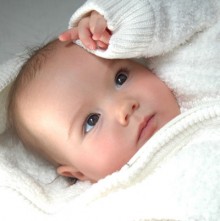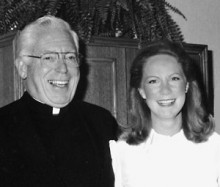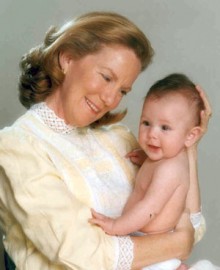
Network of Hope By Una McManus, Reader's Digest, November 1991
Christmas of I983 was filled with promise for Mary Cunningham Agee. She and Bill, her husband of one year, were expecting their first child.
The Agees knew the excitement of moving in the top echelons of corporate America. As president of the couple’s venture-capital firm, Semper Enterprises, Mary enjoyed great professional success. But their spacious home in Osterville, Mass., cried out for the laughter of children.
The pregnancy was an answer to her prayers. When the image of the tiny baby flickered on the sonogram screen, Mary ached to hold her daughter. No sooner had the Christmas tree been put away, however, than Mary was gripped by severe pain. I’m only five months pregnant, she thought. I can’t be in labor! Bill rushed his wife to the hospital, but it was too late. Mary suffered a second-trimester miscarriage.
The baby’s death carved a deep ravine of grief in Mary’s life. She could hardly bear to walk past the silent nursery. For the first time, she saw her husband cry, and she felt an intense loneliness for the child she had lost.
As Mary and Bill held each other in their darkened living room after her return from the hospital, a sentence she had once heard from Bishop Fulton J. Sheen kept running through Mary’s mind: Unless there is a Good Friday, there will never be an Easter Sunday.
What healing resurrection, she wondered, could come out of her pain? "Bill," she asked aloud, "if I feel this much grief over a miscarriage, how must the woman who has an abortion feel—especially if she thinks that’s her only choice?"
She sorted through her thoughts. "Maybe there’s a way to bring good out of our suffering," she said. "Perhaps I can help women with crisis pregnancies." Thus, from the void left by the death of Mary’s daughter, the Nurturing Network was born—a loosely knit community of people who link pregnant women with critical re-sources. Along with it came hope for thousands of desperate women.
To fulfill her dream, Mary knew from her business experience that she would need to approach it professionally. First, she would do an analysis. Who is the woman most likely to choose abortion and why?
The statistics shattered her assumptions. Most abortion clients do not come from disadvantaged homes, nor are they confused teens without access to birth control. Rather, they are from middle-class backgrounds and many are in college or on their first job. Over 70 percent of the 1.6 million abortions in our country each year are performed on women 20 and over.
In order to get to know these women, Mary contacted ten abortion clinics across the country. She asked the staff to give her telephone number to women willing to discuss their experience. Mary learned that most of these women would rather have avoided abortion. "In fact, 91 of the 100 women who phoned said they would have preferred to have given birth if someone had offered them a practical way to do so," says Mary. Since then, she has asked the same questions of hundreds more women--and that basic statistic remains constant.
Mary realized there were few pregnancy-support programs for such women—the achievers, businesswomen and community leaders of tomorrow. Why She points to a general denial of the prevalence of the problem within this sector. "It’s too close to home," Mary says.
The Agees took $300,000 from the sale of their home and used it for seed money to make Mary’s dream a reality. When she opened the first Nurturing Network office in Osterville on Mother’s Day I986, her goals were modest. "I thought if we could help one woman every month, that would be great," says Mary. "That was 2500 women ago."
Her first Client was Clare, who had read about the Network in the newspaper. She was a senior at a strict, private college nearby. "I’m being kicked out of school because I’m pregnant," Clare said. "My boyfriend has left me." Her eyes filled. "My friends say abortion is my only choice, but I couldn’t live with that."
"We can help," Mary said quietly. "Together we’ll find a way."
After the young woman left, Mary called a college president who had expressed an interest in the Network. She agreed to arrange a quick transfer for Clare to her college. Next, Mary found a supportive family close by where Clare could stay. Another Network friend, a doctor, agreed to provide prenatal care at a reduced rate.
Clare thrived in her Nurturing Home and finished both her pregnancy and her college courses that May. She had been considering adoption, but when baby James was born, she decided to raise him herself, with the help of her parents. "How grateful we are for our grandson!" says Clare’s mother.
Not just college students sought out the Network. Emily, a highly successful business consultant in her mid-30s, knew that her out-of-wedlock pregnancy could derail her career. "Can you help me?" she asked Mary. Within a few days, Mary had found Emily a consulting job in a town 3000 miles away, a challenging position that would protect Emily’s privacy. Emily took a leave of absence and lived with a Nurturing Network family in that city.
After much soul-searching, Emily made the painful decision to choose adoption, as do 30 percent of Network women. But a birth mother’s feelings cannot be cut with the umbilical cord. For months after the adoption, Emily sorted out her emotions with a Network counselor. Finally, she felt acceptance that she had done the best thing for her daughter.
Mary Elizabeth Cunningham knew loss very early. When she was five, her parents separated, and her mother struggled to work while raising four children. Mary’s bleak emotional landscape was brightened by her uncle, Monsignor William Nolan, then a chaplain at Dartmouth College. He became Mary’s father figure and spiritual mentor.
One of the most important moments of her life occurred when she was seven, on the day of her First Communion. As Mary and Monsignor Nolan sat in a small rock garden in front of her house, he taught her how to pray the Our Father. She listened to his kind voice and suddenly knew there was a God who loved her infinitely; she wanted to bring that healing love to others. "The Nurturing Network is linked to my miscarriage," she says now, "but it really began in the rock garden."
From that day, this sense of mission permeated Mary’s life. At Harvard Business School, when her professor asked students to predict their ultimate contribution, Mary said, "Running an orphanage" Stunned silence followed.
Mary’s classmates might not have understood her heart, but they respected her keen intellect. She had come to business school as a Phi Beta Kappa graduate from Wellesley College, where she majored in philosophy and logic. She then earned an M.B.A. from Harvard.
From I979 to I980, Mary catapulted into corporate management at the Bendix Corporation while still in her 20s. But she was accused of rising to the top by the oldest route—a romance with her boss, William Agee. Mary staunchly and publicly denied the accusation, but a media circus ensued and she resigned. This crucible drew Mary and Bill together, and a love affair did blossom. They married in June 1982, two years after she left Bendix.
"As a result of my experience at Bendix, I know what it’s like to be judged and ridiculed," she says. "Women with unwed pregnancies are still judged harshly, and the stigma can be bitter enough to push them toward a quick abortion."
Mary knew that many women with crisis pregnancies had known tragedy—trusts betrayed men who had walked out on them. "We are not called to judge," she says. "We are called to help."
In 1988, the Agees and their two small children relocated in Boise, Idaho, where Bill is CEO of Morrison Knudsen Corporation. Mary set up the Nurturing Network’s new home in a suite of offices in downtown Boise.
With a staff of 19 women, mostly unpaid, Mary coordinates a network of over 8500 volunteers "on call" around the country. This computer database includes nearly 500 employers, good homes and 250 colleges.
"If I saw the harsh side of corporate America when I was at Bendix, I now see the compassionate side," she observes. "It was difficult to persuade the first corporations to offer jobs and funds. But colleagues I’d worked with in the past trusted me to run a professional program. Word of mouth brought in others."
A central tenet of the philosophical backbone of the Network is that good often comes through suffering. Such thinking stands in sharp contrast to our pain-avoiding society. But by facing a problem—such as a crisis pregnancy-head-on and refusing to cave in to expediency, character is built.
Agee sees her mission as stepping in where a woman’s own support system of family, friends and the baby’s father has failed. The Network provides help in six critical areas—employment, education, housing, medical care, counseling and finances. Both sides of the abortion debate can (and do) support this concept. Members of the Nurturing Network board come from both "pro-life" and "pro-choice" persuasions.
No woman travels alone. "We’re called to be our sister’s keeper in very concrete ways," Mary says. "We wouldn’t be doing a woman much of a favor if we sent her traipsing around a new city to find her own lonely apartment."
The volunteers who open their homes are people like Jane Kinney, a former bank vice president in her late 30s. When prenatal tests showed her baby suffered a chromosomal abnormality that causes mental retardation, doctors, counselors and friends pressured her to abort. When she refused, her boyfriend walked out on her. Alone, Jane prepared for the birth of her handicapped child.
Baby Georgia was born with a cleft lip, but everything else seemed normal. Tragically, however, the baby died in her sleep when she was three weeks old. Jane’s grief over-whelmed her for nearly a year. Then she read about the Network. Wanting to spare another woman the isolation she had suffered, Jane offered to help.
At the same time in a nearby city, Marta, 26, an immigrant from Peru, found herself alone, pregnant and sleeping on a friend’s floor. Her employers were going to let her go.
Then she saw Mary on a TV talk show, and called the Network’s 800 number (800-TNN-4MOM). "I have no one," Marta said, sobbing. "My boyfriend says it’s him or the baby. I want to kill myself!"
Mary brought the two women together, and Marta moved into Jane’s apartment. The baby arrived on Christmas Day, a beautiful boy-with Down syndrome. Jane was able to guide her friend to the community resources she would need to raise a child with special needs. Marta and baby Miguel stayed with Jane until the new mom found a job and got back on her feet.
Jane strokes Miguel’s hair. "It’s hard to say who helped the other more," she says. Sadness hits across her face. "Working with the Network helped me along my road to recovery. For that, I’ll be eternally grateful." Jane currently attends law school, and plans to specialize in defending the disabled. Besides volunteering with the Network, this is her tribute to her daughter.
"What we're doing reminds me of a story I heard about a little boy," says Mary. He was running up and down a beach, feverishly hurling starfish back into the water before they died. An old man approached him." Do you honestly think your work will make any difference?" he asked skeptically.
The boy looked at him with sparkling eyes, held up a starfish and said, "It makes a difference to this one!" and threw the starfish back into the sea.
"One of TNN's primary objectives is to provide a meaningful way for members of society to cooperate in bringing hope and healing to the most vulnerable among us."
~ Mary Cunningham Agee
_for_Link.jpg)
The vast majority of women who “choose” abortion feel it is their only alternative. In other words, most women who undergo this medical procedure do not experience anything close to the popular rhetoric that refers to “freedom of choice.” Our goal at the Nurturing Network is to ensure that every pregnant woman will know the comfort and freedom of having the support she needs in order to nurture her child's life . . . and make the most of hers as well.
"One of my favorite passages is from Paul Claudel who urges us always to be ‘worthy of the flame consuming us.’ I believe that you are worthy of tht flame.”
~ Ministry Founder
(TNN Collaborator)

"Mary sorted through her thoughts. 'Maybe there’s a way to bring good out of our suffering,' she said. 'Perhaps I can help women with crisis pregnancies.' Thus, from the void left by the death of Mary’s daughter, the Nurturing Network was born—a loosely knit community of people who link pregnant women with critical re-sources. Along with it came hope for thousands of desperate women."
~ Readers Digest
“My cousin was a Monsignor and the Catholic chaplain at Dartmouth for 37 years. He became my father figure. I had the privilege of having one of the most holy, compassionate, and wonderful leaders in our church at our dinner table every night. Friends would say that our dinner conversations sounded like a seminary discussion and I delighted in them.”
~ Mary Cunningham Agee

"The statistics shattered her assumptions. Most abortion clients do not come from disadvantaged homes, nor are they confused teens without access to birth control. Rather, they are from middle-class backgrounds and many are in college or on their first job. Over 70 percent of the 1.6 million abortions in our country each year are performed on women 20 and over."
~ Readers Digest

“It’s so easy for girls or women to be in the wrong situation, become pregnant and then, frightened and alone, succumb to outside pressures to have an abortion. Because of the Nurturing Network, they have so much support that they don’t have to.”
~ Betsy
(TNN Nurturing Home and Adoptive Family)

"Mary Elizabeth Cunningham knew loss very early. When she was five, her parents separated, and her mother struggled to work while raising four children. Mary’s bleak emotional landscape was brightened by her uncle, Monsignor William Nolan, then a chaplain at Dartmouth College. He became Mary’s father figure and spiritual mentor."
~ Readers Digest

"'What we're doing reminds me of a story I heard about a little boy,' says Mary. He was running up and down a beach, feverishly hurling starfish back into the water before they died. An old man approached him, 'Do you honestly think your work will make any difference?’ he asked skeptically. The boy looked at him with sparkling eyes, held up a starfish and said, 'It makes a difference to this one!’ and threw the starfish back into the sea."
~ Readers Digest

"TNN’s mission is to provide a convenient and meaningful way for members of society to cooperate in bringing hope and healing to the most vulnerable among us."
~ Mary Cunningham Agee

